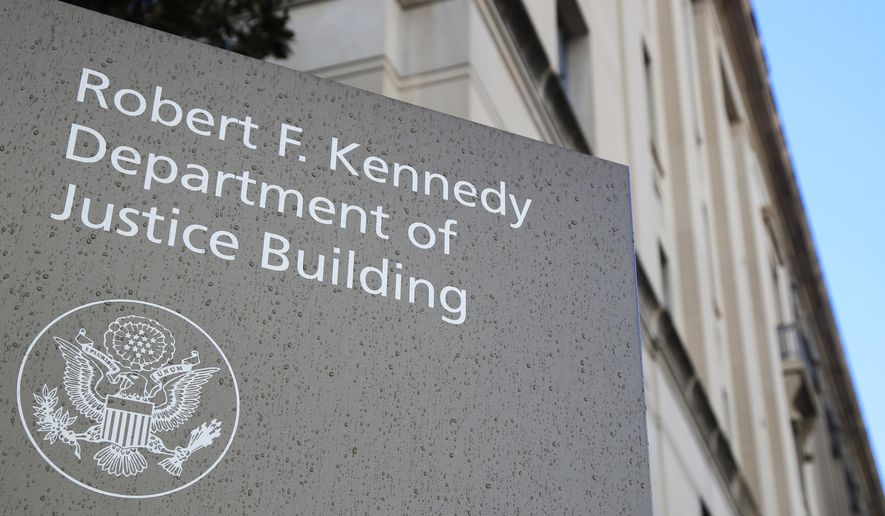The Justice Department on Monday unsealed criminal charges against six members of the infamous Russian hacking group previously charged with stealing the Democratic National Committee’s emails in 2016, accusing them of launching “the most destructive and costly cyber-attacks in history.”
While none of the charges unsealed Monday is related to U.S. election interference, federal prosecutors say they found plenty of other wrongdoing.
The charges link the hackers to widespread cyberattacks across the globe, including knocking Ukraine’s energy grid offline, interference in France’s 2017 presidential election, attacking the 2018 Winter Olympics and a malware attack costing three U.S. health care businesses more than $1 billion.
The indictment also directly ties Russia’s military intelligence unit, known as the GRU, to the attacks. All six defendants were members of GRU 74455.
Several of the countries targeted had blamed the Russian government for the hacks. However, this is the first time officials have targeted Russia for the attacks through criminal indictments.
“As this case shows, no country has weaponized its cyber capabilities as maliciously and irresponsibly as Russia, wantonly causing unprecedented damage to pursue small tactical advantages to satisfy fits of spite,” Assistant Attorney General for National Security John C. Demers told reporters at a press conference announcing the charges.
Russia has repeatedly denied that it engages in destructive cyberattacks against other nations. Last week, the country extended an offer to the U.S. calling for a “cyber reset” between the nations.
Mr. Demers said Monday’s indictment proves that the U.S. should ignore Russia’s offer.
“This indictment lays bare Russia’s use of its cyber capabilities to destabilize and interfere with the domestic political and economic systems of other countries, thus providing a cold reminder of why its proposal is nothing more than dishonest rhetoric and cynical and cheap propaganda,” Mr. Demers said.
The indictment also blames Moscow for cyberattacks on the 2018 Winter Olympics in South Korea, where internet systems were disrupted during the opening ceremony.
U.S. prosecutors say the attack was retaliation for the doping bans imposed on Russian athletes.
Mr. Demers said the attack “combined the emotional maturity of a petulant child with the resources of a nation-state.”
Grigory Rodchenkov, the former head of Russia’s national anti-doping laboratory, who blew the whistle on the Olympic doping scheme, called for the Justice Department to take stronger action against Russia.
“Today’s indictments will change nothing because we will never capture GRU operatives on U.S. soil. But, Russia uses many others who do travel internationally to carry out this war, and that is where we must focus our efforts. The DOJ needs the tools to investigate them, arrest them during their international travels and bring them to the U.S. to face the consequences,” he said in a statement.
The charges were returned last week by a grand jury in Pittsburgh, where one of the U.S. health care companies that was a malware victim is based. That company, Heritage Valley Health System, had patient medical care disrupted because of the attack, prosecutors said.
Heritage Valley Health Systems is said to be a victim of the 2017 NotPetya malware attack, one of the most widespread and debilitating attacks in history.
The attack cost the company access to patient lists, patient history, laboratory records and physical examination files for roughly one week, according to the indictment, which called the attack “a threat to public safety and health.”
Some of the NetPetya malware deployed by GRU 74455 was unleashed on two other U.S. businesses, including a FedEx Corp. subsidiary and a large U.S. pharmaceutical manufacturer, causing a collective loss of roughly $1 billion for the three victims.
The defendants — Yuriy Sergeyevich Andrienko, Sergey Vladimirovich Detistov, Pavel Valeryevich Frolov, Anatoliy Sergeyevich Kovalev, Artem Valeryevich Ochichenko and Petr Nikolayevich Pliskin — are believed to be in Russia and will likely never see a U.S. courtroom.
All six were immediately placed on the FBI’s Most Wanted list.
Each is charged with seven counts of conspiracy to conduct computer fraud and abuse, conspiracy to commit wire fraud, wire fraud, damaging protected computers and aggravated identity theft.
Rep. Jim Langevin, Rhode Island Democrat and chairman of the House Armed Services Committee’s subcommittee on intelligence, hailed the Justice Department for “building a solid case” against Russia’s cyberactivities.
“From NotPetya to the 2018 Winter Olympic Games, Russian hackers working directly for the Russian government have wreaked havoc on systems around the world, causing billions of dollars in damage and destabilizing the cyber ecosystem,” he said in a statement.
• Jeff Mordock can be reached at jmordock@washingtontimes.com.




Please read our comment policy before commenting.